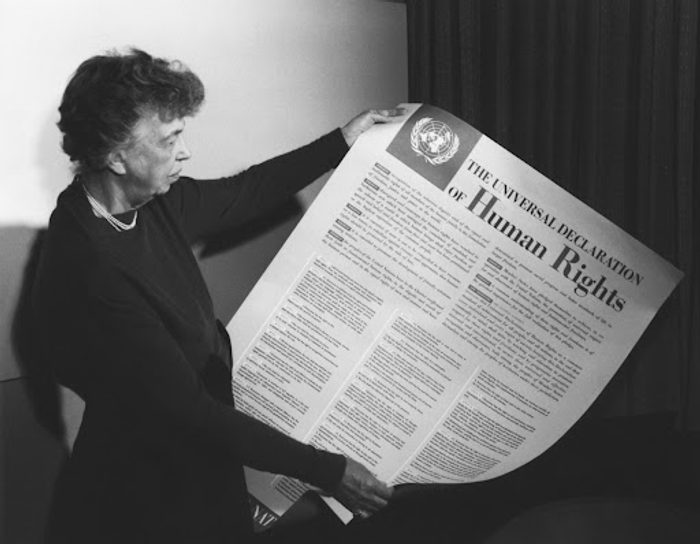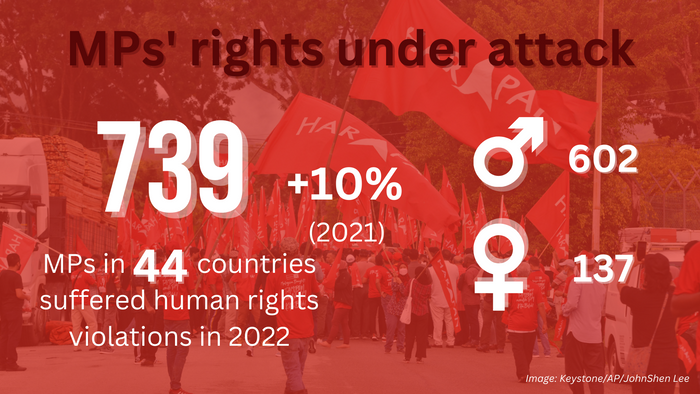Good morning, this is Pip. Human Rights Day on Saturday 10 December, will mark 74 years since the Universal Declaration of Human Rights was signed. In the wake of the horrors of the Second World War, nations from around the world came together and agreed on an extensive list of fundamental rights every person on the planet should enjoy. But over seven decades later, in the face of today’s countless human rights challenges and violations, is the declaration still relevant to our world? |
|
Universal Declaration of Human Rights: fit for the 21st century?
|
|

Eleanor Roosevelt, diplomat, activist and former first lady of the United States, holding the Universal Declaration of Human Rights the day it was adopted on 10 December 1948. (Keystone/Science Photo Library/Library of Congress)
|
|
Given the geopolitical tensions and conflict across the world today, it may be difficult to believe that 74 years ago on 10 December 1948 countries from around the globe came together and almost unanimously agreed on an extensive list of fundamental rights that every human on the planet should enjoy.
The opening statement of the Universal Declaration of Human Rights (UDHR) asserted that “all human beings are born free and equal in dignity and rights”. What followed were 30 articles outlining the rights and freedoms of every person that deserve universal protection to ensure a peaceful, free and just world.
With the end of the Second World War and the creation of the United Nations, the international community vowed to never allow the “barbarous acts which…outraged the conscience of mankind” to happen again. A drafting committee led by diplomat, activist and former first lady of the United States Eleanor Roosevelt, and composed of countries from across the globe worked for two years before it was finally adopted by the General Assembly in 1948.
“We stand on the threshold of a great event, both in the life of the United Nations and of mankind,” Eleonor Roosevelt said in an address to member states the day before the declaration was brought to a vote. She said the international bill of rights would serve as a “common standard of achievement for all peoples of all nations”.
With the world facing human rights challenges on so many fronts, some might be tempted to dismiss the declaration as idealistic or unrealistic – a non-legally binding document that nations may claim to adhere to on the international stage, but disregard entirely depending on their own political agendas. However, defenders of the UDHR argue that to judge it on how often it is violated is to miss its point altogether.
Read the full story on Geneva Solutions
|
|
Here's what else is happening
|

IPU helped to successfully lobby for the release of Malaysian politician Anwar Ibrahim from prison in 2018. He was sworn in as prime minister on 24 November, 2022. The image shows Ibrahim waving to supporters ahead of the election on 5 November 2022. (Keystone/AP Photo/JohnShen Lee)
|
|
⚖️ Record number of MPs suffer human rights violations in 2022.
That’s according to the Inter-Parliamentary Union’s (IPU) latest findings, which reveal a 10 per cent rise in cases compared with the previous year. The organisation, which defends the rights of persecuted parliamentarians, said the most common violations reported continue to be attacks on MPs’ freedom of expression followed by suspension or loss of parliamentary mandate, threats and acts of intimidation and lack of a fair trial.
Cases in the Middle East and North Africa significantly increased driven by the political situation in Tunisia following the dissolution of parliament in March 2022 and violations experienced by several MPs. The number of cases concerning women parliamentarians also jumped to 137 in 2022 compared with 123 in 2021. There were some wins, however, for the IPU’s parliamentarian human rights committee in countries including Malaysia, Ecuador, Turkey and the Democratic Republic of Congo, where it managed to close cases following the release of parliamentarians there.
IPU (EN)
|
|
|
GS news is a new media project covering the world of international cooperation and development. Don’t hesitate to forward our newsletter!
Have a good day!
|

|
|
Avenue du Bouchet 2
1209 Genève
Suisse
|
|
|
|









